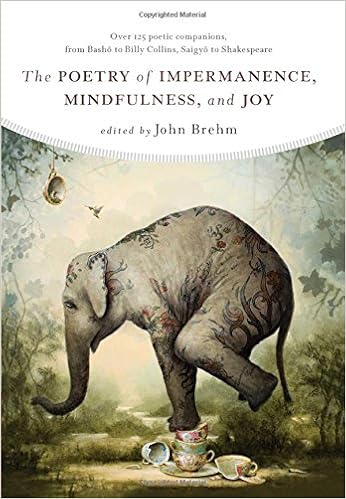 Each morning D and me have a "meeting" where we review our plans for the day and then share short readings. We're currently working through a book of "Over 125 poetic companions, from Basho to Billy Collins, Saigyo to Shakespeare" The title of this collection is The Poetry of Impermanence, Mindfuness, and Joy. edited by John Brehm.
Each morning D and me have a "meeting" where we review our plans for the day and then share short readings. We're currently working through a book of "Over 125 poetic companions, from Basho to Billy Collins, Saigyo to Shakespeare" The title of this collection is The Poetry of Impermanence, Mindfuness, and Joy. edited by John Brehm.This morning's non-titled piece was written by Portuguese author Fernando Pessoa.
Calm because I'm unknown,
And myself because I'm calm.
I want to fill my days
With wanting nothing from them.
For those whom wealth touches,
Gold irritates the skin.
For those on whom fame glows,
Life fogs over.
On those for whom happiness
Is their sun, night will fall.
But those who hope for nothing
Are glad for whatever comes.
"I want to fill my days with wanting nothing from them." I'm sure that for most of my life this line of thinking would seem like non-sensical buddha babble. Maybe it's starting to make more sense now because I'm getting old and it's foolish to hope for too much. Maybe, but I think/know its more than that..
Reading the lines of this poem was like hearing the clear, shimmering, beautiful sound of a wooden hammer hitting the side of a Tibetan singing bowl on the fifth day of a meditation retreat. A welcome call to reenter a place of peace and stillness. A hopeless refuge.
In December, 2010 one of my earliest blog posts had extended excerpts from East Coker, one of Four Quartets by T.S. Eliot. These lines seem especially apropos here...
I said to my soul, be still, and wait without hope
For hope would be hope for the wrong thing; wait without love,
For love would be love of the wrong thing; there is yet faith
But the faith and the love and the hope are all in the waiting.
Wait without thought, for you are not ready for thought:
So the darkness shall be the light, and the stillness the dancing.
Whisper of running streams, and winter lightning.
The wild thyme unseen and the wild strawberry,
The laughter in the garden, echoed ecstasy
Not lost, but requiring, pointing to the agony
Of death and birth.
How wonderful it is to find words like these. Thank you Mr. Passao and Mr. Eliot.
